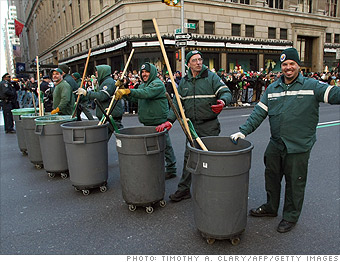Almost no one in America would admit to being overpaid, but many of us take home bloated paychecks far beyond what we deserve.
"Fair compensation" is a relative term, yet HR consultants and executive headhunters agree some jobs command excessive pay that can't be explained by labor supply-and-demand imbalances.
And while it's easy to argue chief executives, lawyers and movie stars are overpaid, reality is not that cut and dried.
Corporate attorneys earn $500-plus an hour and plaintiffs lawyers pocket a third of big personal-injury settlements, but local prosecutors and public defenders get paid little in comparison. Specialty surgeons may earn $1 million or more, while some family-practice doctors are hard-pressed to pay off medical-school loans.
Hollywood stars making $20 million a movie or $10 million per TV-season qualify for many people's overpaid list. But for every one of those actors and actresses, there are a thousand waiting tables and taking bit movie parts or regional theater roles awaiting a big break that never comes. Join the "Shades of Green" discussion.
"A lot of people are overpaid because there are certain things consumers just don't want screwed up," said Bill Coleman, senior vice president of compensation for Salary.com. "You wouldn't want to board a plane flown by a second-rate pilot or hire a cheap wedding photographer to record an event you hope happens once in your lifetime.
"With pro athletes, one owner is willing to pay big money for a star player and then all the other players want to keep up with the Joneses," Coleman said. "The art with CEO pay is making sure your CEO is above the median -- and you see where that goes."
What follows is a list of the 10 most overpaid jobs in the U.S., in reverse order, drafted with input from compensation experts:
1) Mutual-fund managers
Everyone on Wall Street makes far too much for the backbreaking work of moving money around, but mutual fund managers are emerging as among the most reprehensible.
This isn't kicking 'em when they're down, given the growing fund-industry scandal. They've been long overpaid. Stock-fund managers can easily earn $500,000 to $1 million a year including bonuses -- even though only 3 in 10 beat the market in the last 10 years.
Now we discover an untold number enriched themselves and favored clients with illegally timed trades of fund shares. That's a worse betrayal of trust than the corporate scandals of recent years, since they're supposed to be on the little person's side.
Put aside what fund managers earn and consider their bosses. Putnam's ex-CEO Lawrence J. Lasser's income rivals the bloated pay package that sparked New York Stock Exchange President Dick Grasso's ouster. Lasser's take: An estimated total of $163 million over the last five years.
2) Washed-up pro athletes in long-term contracts
Pro athletes at the top of their game deserve what they earn for being the best in their business. It's those who sign whopping, long-term contracts after a few strong years, and then find their talents vanish, who reap unconscionable sums of money.
NBA player Shawn Kemp, for instance, earned $10 million in a year he averaged a pathetic 6.1 points and 3.8 rebounds a game. Atlanta Braves pitcher Mike Hampton earned $9.5 million -- in the second year of an eight-year, $121 million contract -- while compiling a 7-15 won-loss record for the Colorado Rockies with a pitiful earned-run average of 6.15.
Thank the players' unions for refusing to negotiate contracts based on performance -- and driving up the cost of tickets to levels unaffordable for a family of four, especially for football and basketball. They point to owners as the culprits, yet golf star Tiger Woods and tennis champ Serena Williams earn their keep based on their performance in each tournament
3) CEOs of poorly performing companies
Most U.S. chief executives are vastly overpaid, but if their company is rewarding shareholders and employees, producing quality products of good value and being a responsible corporate citizen, it's hard to take issue with their compensation.
CEOs at chronically unprofitable companies and those forever lagging industry peers stand as the most grossly overpaid. Most know they should resign -- in shareholders' and employees' interest -- but they survive because corporate boards that oversee them remain stacked with friends and family members.
The ultimate excess comes after they're finally forced out, usually by insiders tired of seeing their own stock holdings plummet. These long-time losers draw multimillion-dollar severance packages as a reward for their failed stewardship.
4) Orthodontists
For a 35-hour workweek, orthodontists earn a median $350,000 a year, according to the Journal of Clinical Orthodontics. General dentists, meanwhile, earn about half as much working 39 hours a week on average, in a much dirtier job.
The difference in their training isn't like that of a heart surgeon vs. a family-practice doctor. It's a mere two years, and a vastly rewarding investment if you're among the chosen: U.S. dental schools have long been criticized for keeping orthodontists in artificially low supply to keep their income up.
This isn't brain surgery: Orthodontists simply manipulate teeth in a growing child's mouth -- and often leave adjustment work to assistants whose handiwork they merely sign off on. What makes their windfall egregious is that they stick parents with most of the inflated bill, since orthodontia insurance benefits cover nowhere near as large a percentage as for general dentistry.
5) Motivational speakers and ex-politicians on the lecture circuit
Whether it's for knighted ex-Mayor Rudy Guiliani or Tom "In Search of Excellence" Peters, corporate trade groups pay astronomical sums to celebrity-types and political has-beens to address their convention audiences.
Former President Reagan raised the bar back in 1989 when he took $2 million from Japanese business groups for making two speeches. Bill Clinton earned $9.5 million on 60 speeches last year, though most of those earnings went to charity and to fund his presidential library.
The national convention circuit's shame is that it blows trade-group members' money on orators whose speeches often have been warmed over a dozen times.
6) Real estate agents selling high-end homes
Anyone who puts in a little effort can pass the test to get a real estate agent's license, which makes the vast sums that luxury-home agents earn stupefying.
While most agents hustle tail to earn $60,000 a year, those in affluent areas can pull down $200,000-plus for half the effort, courtesy of the fatter commissions on pricier listings.
Luxury home agents live off the economy's fat, yet many put on airs as if they're members of the class whose homes they're selling, and eye underdressed open-house visitors as if they're casing the joint.
7) Skycaps at major airports
Many of the uniformed baggage handlers who check in luggage at curbside at the busiest metro airports pull in $70,000 to $100,000 a year -- most of it in cash.
On top of their salaries, peak earners can take in $300 or more a day in tips. Sound implausible? That amounts to a $2 tip from 18 travelers an hour on average. Many tip more than that.
While most skycaps are cordial, a good many treat customers with blank indifference, knowing harried travelers don't want to brave counter check-ins, especially in the post 9/11 age.
8) West Coast longshoremen
In early 2002, West Coast ports shut down as the longshoremen's union fought to preserve generous health-care benefits that would make most Americans drool. The union didn't demand much in wage hikes for good reason: Its members already were making a boatload of money.
Next year, West Coast dockworkers will earn an average of $112,000 for handling cargo, according to the Pacific Maritime Association, their employer. Office clerks who log shipping records into computers will earn $136,000. And unionized foremen who oversee the rank-and-file will pull down an average $177,000.
Unlike their East Coast union brethren who compete with non-union ports in the South and Gulf of Mexico, the West Coast stevedores have an ironfisted lock on Pacific ports. Given their rare monopoly, they can disrupt U.S. commerce -- as they did during the FDR years -- and command exorbitant wages, even though their work is more automated and less hazardous than in the days of "On the Waterfront."
9) Major airline pilots
While American and United pilots recently took pay cuts, senior captains earn as much as $250,000 a year at Delta, and their counterparts at other major airlines still earn about $150,000 to $215,000 - several times pilot pay at regional carriers - for a job that technology has made almost fully automated.
By comparison, senior pilots make up to 40 percent less at low-fare carriers like Jet Blue and Southwest, though some enjoy favorable perks like stock options. That helps explain why their employers are profitable while several of the majors are still teetering on the brink of bankruptcy.
The pilot's unions are the most powerful in the industry. They demand premium pay as if still in the glory days of long-gone Pan Am and TWA, rather than the cutthroat, deregulated market of under-$200 coast-to-coast roundtrips. In what amounts to a per-passenger commission, the larger the plane, the more they earn - even though it takes little more skill to pilot a jumbo jet. It's as much the airplane mechanics who hold our fate in their hands.
10) Wedding photographers
Photographers earn a national average of $1,900 for a wedding, though many charge $2,500 to $5,000 for a one-day shoot, client meeting and processing time that runs up to 20 hours or more, and the cost of materials.
The overpaid ones are the many who admit they only do weddings for the income, while quietly complaining about the hassle of dealing with hysterical brides and drunken reception guests. They mope through the job with the attitude: "I'm just doing this for the money until Time or National Geographic calls."
Much of their work is mediocre as a result. How often have you really been wowed flipping the pages of a wedding album handed you by recent newlyweds? Photographers who long for the day they can say "I don't do weddings" should leave the work to the dedicated ones who do.
If only we were all so fortunate.
 Many of you tell us that you’ll take any job as long as it pays the bills. Here’s one way this tool might fit in. Say you need to earn $50,000 to support yourself and your family. Type in your location and that number and — voila! — you’ll receive a list of jobs that match that pay an average of $50,000 in your area.
Many of you tell us that you’ll take any job as long as it pays the bills. Here’s one way this tool might fit in. Say you need to earn $50,000 to support yourself and your family. Type in your location and that number and — voila! — you’ll receive a list of jobs that match that pay an average of $50,000 in your area. 










 Lizandra Vega, author of 'The Image of Success: Make a Great Impression and Land The Job You Want'
Lizandra Vega, author of 'The Image of Success: Make a Great Impression and Land The Job You Want'























